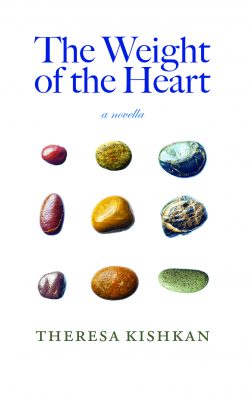#815 A confluence of passages
The Weight of the Heart
by Theresa Kishkan
Windsor, ON: Palimpsest Press, 2020
$15.95 / 9781989287477
Reviewed by David Stouck
*
 This newly published novella by one of BC’s most prolific and accomplished authors eludes easy categorization because it is part travel writing, part family tragedy, part literary history and part cartography. The young narrator, Isabel, sets out on a journey into the BC Interior with two seemingly unrelated goals: to learn more about her much-loved older brother who died while kayaking in the turbulent waters of the Thompson River, and to find materials for a graduate thesis she is writing about BC’s early women novelists — namely Ethel Wilson and Sheila Watson.
This newly published novella by one of BC’s most prolific and accomplished authors eludes easy categorization because it is part travel writing, part family tragedy, part literary history and part cartography. The young narrator, Isabel, sets out on a journey into the BC Interior with two seemingly unrelated goals: to learn more about her much-loved older brother who died while kayaking in the turbulent waters of the Thompson River, and to find materials for a graduate thesis she is writing about BC’s early women novelists — namely Ethel Wilson and Sheila Watson.
Her first quest, to learn more about her beloved brother, has a suicidal aspect. Before her trip into the Interior she goes swimming at Sombrio Beach and for a moment lets the waves made by a group of whales pull her down into the depths of the water — easy “to simply let go and sink under.” At Lytton where her brother’s body was found on the edge of the river, a guide who remembers James takes her rafting and once in the water she has a deep urge to unzip her life-jacket and let herself drown.


But a stronger urge carries her forward — to find the places that Wilson and Watson wrote about, specifically Lac Le Jeune and Dog Creek. This brings her to think about maps as she drives. For James, maps measured distances and he liked them folded “just so”; but for Isabel distances are measured by landmarks — by a giant pine, by the first scent of sage in the air, by the felt contours of the road.
Thinking about the two early writers and how they mapped parts of the province for their readers, she proposes a feminist cartography — maps as dynamic systems with potential for change, where body and spirit meet. “How,” she asks, “did Wilson and Watson find in the hard physical world a correlative for their language?” “What urgency made them write these places into being?” (Dispersed throughout the text are one-page passages, chiefly unpunctuated lists, attributed to the memory function of rivers, birds, trees, and tunnels.)
The book Kishkan has written also has its secrets and the title is one of them. The author has explained that James, in his early youth, was an Egyptologist and his sister references several passages from ancient Egyptian funerary texts. One of these specifically records that the heart when weighed by Anubis must be light as a feather if the body is to pass into the next world.
The story is rich in mysteries and in musical references. We are invited, for example, to listen to Joan Baez and Emmylou Harris. But there is nothing mysterious in the author’s closing reference to Ethel Wilson and Sheila Watson: “I wanted them to know they have written books so beautiful that they’ve entered my body, and they have shaped the way I see the land.” Theresa Kishkan extends this experience to her readers in an elusive and richly evocative story that should be read at least twice.
*

David Stouck is an editor and biographer. His latest book is Arthur Erickson: An Architect’s Life (Douglas & McIntyre, 2013). His earlier books include Ethel Wilson: A Critical Biography (University of Toronto Press, 2003) and Genius of Place: Writing about British Columbia (Raincoast Books, 2000, co-edited with Myler Wilkinson). Editor’s note: David Stouck has also reviewed books by Laisha Rosnau (with Mary-Ann Stouck), Kevin Spenst, Clea Roberts, and Eden Robinson for The Ormsby Review.
*
The Ormsby Review. More Books. More Reviews. More Often.
Publisher and Editor: Richard Mackie
The Ormsby Review is a journal service for in-depth coverage of B.C. books and authors. The Advisory Board consists of Jean Barman, Robin Fisher, Cole Harris, Wade Davis, Hugh Johnston, Patricia Roy, David Stouck, and Graeme Wynn. Scholarly Patron: SFU Graduate Liberal Studies. Honorary Patron: Yosef Wosk. Provincial Government Patron since September 2018: Creative BC
“Only connect.” – E.M. Forster
7 comments on “#815 A confluence of passages”
Yes, the protagonist’s ‘death wish’ — as I read it — acted as the novella’s centre of gravity for me. What a powerful force that is.
It’s like the ticking time bomb beneath the seat of the passengers having a discussion on the train (where did i read that?) which, if the reader knows such a bomb is ticking, lends great importance to every word of their casual chit-chat.
Cheers from the Sunshine Coast.